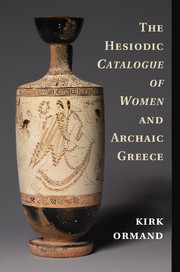Description
The Hesiodic Catalogue of Women and Archaic Greece
Author: Ormand Kirk
The first unified interpretation of the Catalogue of Women in English in more than twenty-five years, in the context of related poetry from the time.
Language: English
Subject for The Hesiodic Catalogue of Women and Archaic Greece:
Approximative price 85.25 €
In Print (Delivery period: 14 days).
Add to cart
The Hesiodic Catalogue of Women and Archaic Greece
Publication date: 04-2014
Support: Print on demand
Publication date: 04-2014
Support: Print on demand
Approximative price 28.98 €
In Print (Delivery period: 14 days).
Add to cart
The Hesiodic Catalogue of Women and Archaic Greece
Publication date: 03-2019
Support: Print on demand
Publication date: 03-2019
Support: Print on demand
Description
/li>Contents
/li>Biography
/li>
This book examines the extant fragments of the archaic Greek poem known in antiquity as Hesiod's Catalogue of Women. Kirk Ormand shows that the poem should be read intertextually with other hexameter poetry from the eighth to sixth century BCE, especially Homer, Hesiod, and the Cyclic epics. Through literary interaction with these poems, the Catalogue reflects political and social tensions in the archaic period regarding the production of elite status. In particular, Ormand argues that the Catalogue reacts against the 'middling ideology' that came to the fore during the archaic period in Greece, championing traditional aristocratic modes of status. Ormand maintains that the poem's presentation of the end of the heroic age is a reflection of a declining emphasis on nobility of birth in the structures of authority in the emerging sixth century polis.
1. Introduction: the Hesiodic Catalogue of Women; 2. The Catalogue and the mystery of the disappearing hedna; 3. Marriage, identity, and the story of Mestra; 4. Atalanta reflects the Iliad; 5. Then there was the one who was Alkmene; 6. The marriage of Helen and the end of the Catalogue; 7. Epilogue: women, middling discourse, and the polis.
Kirk Ormand is Professor of Classics at Oberlin College, Ohio. He is author of Exchange and the Maiden: Marriage in Sophoclean Tragedy (1999) and Controlling Desires: Sexuality in Ancient Greece and Rome (2008), and editor of A Companion to Sophocles (2012). He has published articles on Homer, Sophocles, Euripides, Ovid, Lucan, the Greek Novel, and Clint Eastwood. He is the recipient of the Basil Gildersleeve Prize from the American Journal of Philology, the Barbara McManus Prize from the Women's Classical Caucus of the American Philological Association, and the John J. Winkler Memorial Prize. Ormand has traveled extensively in Greece, and held the post of Whitehead Professor of the American School of Classical Studies in Athens during the 2007–8 academic year. He also held a Solmsen Fellowship at the Center for the Study of the Humanities, University of Wisconsin, Madison, in 1999–2000.
© 2024 LAVOISIER S.A.S.




